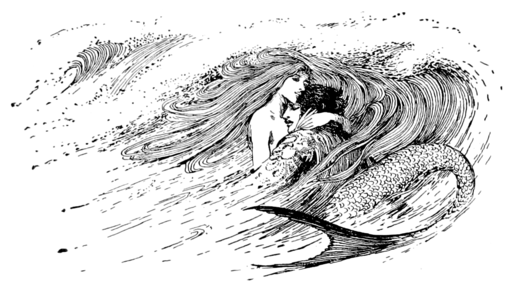5 ♦ The Little Mermaid
Not gonna lie...I cried. :(
This is an original fairytale by Hans Christen Andersen (who also wrote the lesser-known "The Wild Swans," probably my favorite fairytale of all time). Most people know "The Little Mermaid" from the Disney film, and initially the plots are very similar. A young mermaid, forever fascinated by the world of humans, is finally allowed to rise to the surface of the sea on her fifteenth birthday. As it would happen, she falls in love with a human prince, who is also celebrating his birthday on board a ship. And - as it always does - the little mermaid's love is a lost cause, because when she tries to escape the world she was born into, it comes at a terrible price.
I almost just called her "Ariel," but Andersen's mermaid, prince, and Sea King are anonymous throughout the story. It makes it even more poignant, I think, and maybe that is the power of these old fairytales - you are allowed to project your own characterization onto the character, except for those traits that stand out most, like the little mermaid's voice. You know you are only going to follow their lives for the duration of the short story, and they're like strangers whom, for one moment in your life, you get to know.
There are so many things wrong with this story. I am going to get a bit analytical here, and be warned of all the major spoilers below the cut:
Andersen's version of the mermaid "race" is a strange, strange conglomeration of different philosophies and religions. It reads more like mythology than a fairytale. Essentially, the little mermaid learns she must become human to have a chance at winning the prince's heart, and (in the same breath) her marriage to him would be the only way for her to gain an immortal soul, and the future of "heaven."
To become human, she has to get a magic potion from a nasty sorceress-mermaid, and to pay for the potion, she must give her gift - her uniquely beautiful voice. This is no Disneyfied metaphor; the poor little mermaid actually lets the sorceress cut out her tongue. I sure didn't remember that bit from childhood. And of course, to walk is torture for her. Her feet literally bleed from it as she follows the prince on his excursions in the mountains.
This prince must be the cruelest jerk who ever held the title. He uses her as his listener, friend, and girlfriend, and even tells her he would marry her, but for everybody's expectations. In the end, he marries a princess and forgets all about her, the girl who saved his life and could not even tell him that she had.
By no means would I give this story to a child young enough to take it seriously. As an older reader, I found the portrayal of heartbreak to be quite moving, even insightful. It is a hard but important lesson to learn - that, do what you might (and especially wrong), you may not get what you want. Some people don't deserve you, and some things aren't meant to be. The prince may not be as noble and good as he looks.
Others have taken issue with the happy ending, and I have to agree. My quibble is not with the happiness of the ending, but with the moral: because of her good deeds, the little mermaid is given a chance to earn immortal life as a "daughter of the air" (Angel? Bird? Cloud? What does it mean?). Herein lies the problem - what are these "good deeds" she has done? True, she saved the prince's life. But she also took help from the sorceress, and her whole quest for immortality was tied to the prince in the first place. I can suspend some disbelief given her naivete; however, this still feels like a plot hole.
*sigh* I have such a love/hate feeling about this story. It could be written much better, yet at the same time, its brutality is (perhaps) key to the message. 3 out of 5 stars.



Comments